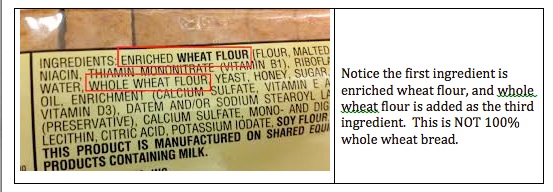"Enriched white flour." When I see that on a label, I politely put the box down and move on. As I understand it, "enriched" means that in the processing, all the nutritional value is sucked out, than added back in. Not exactly ideal.
 |
| Via livelight.org |
"Vitamins Hide the Low Quality of Our Food" by Catherine Price explains that food manufacturers know that chucking in a little supplementary nutrition into their quasi-edibles will bump up sales. Sure, you may be getting your vitamins, but it's from junk that isn't exactly health-friendly.
Nutritionists are correct when they tell us that most of us don’t need to be taking multivitamins. But that’s only because multiple vitamins have already been added to our food.
Fortification is everywhere, like fluoride in the water and iodine in salt.
But the very processing that’s necessary to create long shelf lives destroys vitamins, among other important nutrients. It’s nearly impossible to create foods that can sit for months in a supermarket that are also naturally vitamin-rich.
Consuming the actual vegetable, however, as opposed to various isolated vitamins:
And adding back vitamins after the fact ignores the issue of synergy: how nutrients work naturally as opposed to when they are isolated. A 2011 study on broccoli, for example, found that giving subjects fresh broccoli florets led them to absorb and metabolize seven times more of the anticancer compounds known as glucosinolates, present in broccoli and other cruciferous vegetables, than when glucosinolates were given in straight capsule form. The researchers hypothesized that this might be because the whole broccoli contained other compounds that helped people’s bodies put the anticancer chemicals to use.
"A Handful of Health for Rich and Poor" by Jane E. Brody reports on the miraculous qualities of nuts. Across the board, risk factors included, consuming nuts reduced death rates. Wild.

That should be the snack of choice—not the prepackaged, fortified stuff.
Very interesting book that I'm currently reading that you might appreciate:
ReplyDeletewww.amazon.com/Its-Not-About-Broccoli-Lifetime/dp/0399164189
Another reason to avoid foods with enriched flours is that they contain synthetic forms of folate, which is commonly known as "folic acid". Folic acid is ok for many people but it is strongly advised that whoever has one or two MTHFR mutations should avoid the synthetic forms of folic acid, and instead take methylated folate (the format native to your body). Folic acid is much faster absorbed by your body and it has to work extra hard to convert it to methylated folate, and the methylation process for someone with MTHFR is severely limited. So stick with real folate found in good grains, produce -- and if you must supplement, take a methylated folate supplement.
ReplyDeleteAnon: Sounds interesting! I have to give it a read.
ReplyDeleteFunnily enough, broccoli is the one, universally beloved vegetable in the my family. I think it's because it looks entertaining.
Rachel: I never heard of the MRHFR mutation. Fascinating!